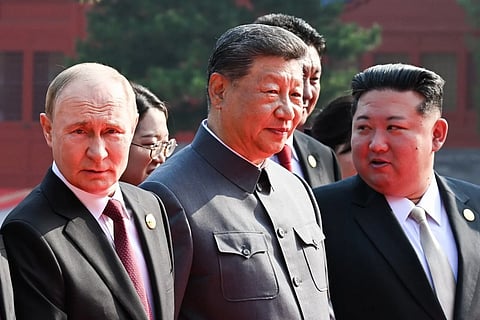

Thousands of soldiers marching in tight formations, state-of-the-art weapon systems — including intercontinental ballistic missiles (ICBMs), rocket launchers and battle tanks — and above all, Chinese President Xi Jinping projecting power from a grandstand above the iconic portrait of the founder of the People’s Republic, Mao Zedong, on Tiananmen Square in Beijing.
These images circulated worldwide on Wednesday. Twenty-six heads of state and government from Asia, the Middle East, Africa and Latin America attended the parade.
From Europe, Russian President Vladimir Putin, Slovak Prime Minister Robert Fico and Serbian President Aleksandar Vucic were present in the Chinese capital.
It sends out a clear signal that China intends to dictate the rules in a future world order, a report in the German media outlet DW.com pointed out. "In autocracies, military parades like this are one of the tools used to demonstrate perceived or actual strength," said Eberhard Sandschneider, professor emeritus of political science at the Free University of Berlin and partner at the consulting firm Berlin Global Advisors.
"Driven by its economic boom, China is in the process of expanding its international role. Under President Xi Jinping, this process has gained significant momentum once again."
Xi, 72, has a clear vision: by 2049, the 100th anniversary of the founding of the People’s Republic, China must become a "modern socialist country that is prosperous, strong, democratic, civilised and harmonious."
Projections by several renowned consulting firms show that the Asian giant could replace the US as the world’s largest economy within 15 years.
China is also expanding its leadership role politically, for instance in international organisations such as BRICS and the Shanghai Cooperation Organisation (SCO).
Through its Belt and Road Initiative (BRI), a massive infrastructure project launched in 2013 by President Xi and which now has 153 signatory states, China is steadily strengthening its global partnerships.
The China–Pakistan Economic Corridor (CPEC), SGR high-speed trains in Kenya, and most recently, the development of the Chancay megaport on Peru’s coast, are examples of such cooperation.
China is using this intertwining of economics and politics to advance its vision of a new world order for the Global South.
While ideas for public infrastructure projects emerge through government consultations, the China-led Asian Infrastructure Investment Bank (AIIB) or other Chinese state banks grant loans aligned with Beijing’s foreign policy goals. On Monday, SCO leaders also decided to establish a new multilateral development bank.
Concerns persist, however, about these institutions failing to adhere to international standards on labour rights and environmental protection.
In many cases, Chinese contractors receive Chinese money and dispatch Chinese workers abroad to execute the projects. But partner countries bear the debt burden, often with damaging consequences: the heavier their debt, the greater their dependence on Beijing.
Anyone criticising China’s human rights record in Tibet or against the Muslim Uyghur minority in Xinjiang is excluded. Conversely, those recognising Taiwan as a Chinese province are financially rewarded.
This "China model" is criticised in the West, but is gaining increasing support in the Global South. Olusegun Obasanjo, a former president of Nigeria, has called on African countries to learn from the "China model". China’s remarkable progress in recent decades is "a source of inspiration and opportunity for Nigeria and Africa," Obasanjo told China’s Xinhua news agency.
Meanwhile, the US, once the most important donor, cut back almost all of its foreign aid under the Trump administration. Following the closure of the development agency USAID, US President Donald Trump announced last week that he was slashing $5 billion (£4.3 billion) in foreign aid that had already been allocated by Congress earlier this year.
Xi’s goal is to "democratise" international relations and oppose "hegemony," says Claus Soong, a researcher at the Mercator Institute for China Studies (MERICS), a Berlin-based think tank. "This approach continuously influences and sharpens China’s world view. However, it is not rooted in a liberal order or liberal ideas. Its origin lies solely in statism, in national interests."
Diplomats in the Chinese Foreign Ministry are currently drafting a master plan aimed at reforming "global governance," Soong said. This, they argue, is necessary because global crises are becoming more frequent and international power relations are shifting.
With pomp, pageantry and patriotism, China presents itself as a global superpower. Will the "China model" be its next big export to the world?